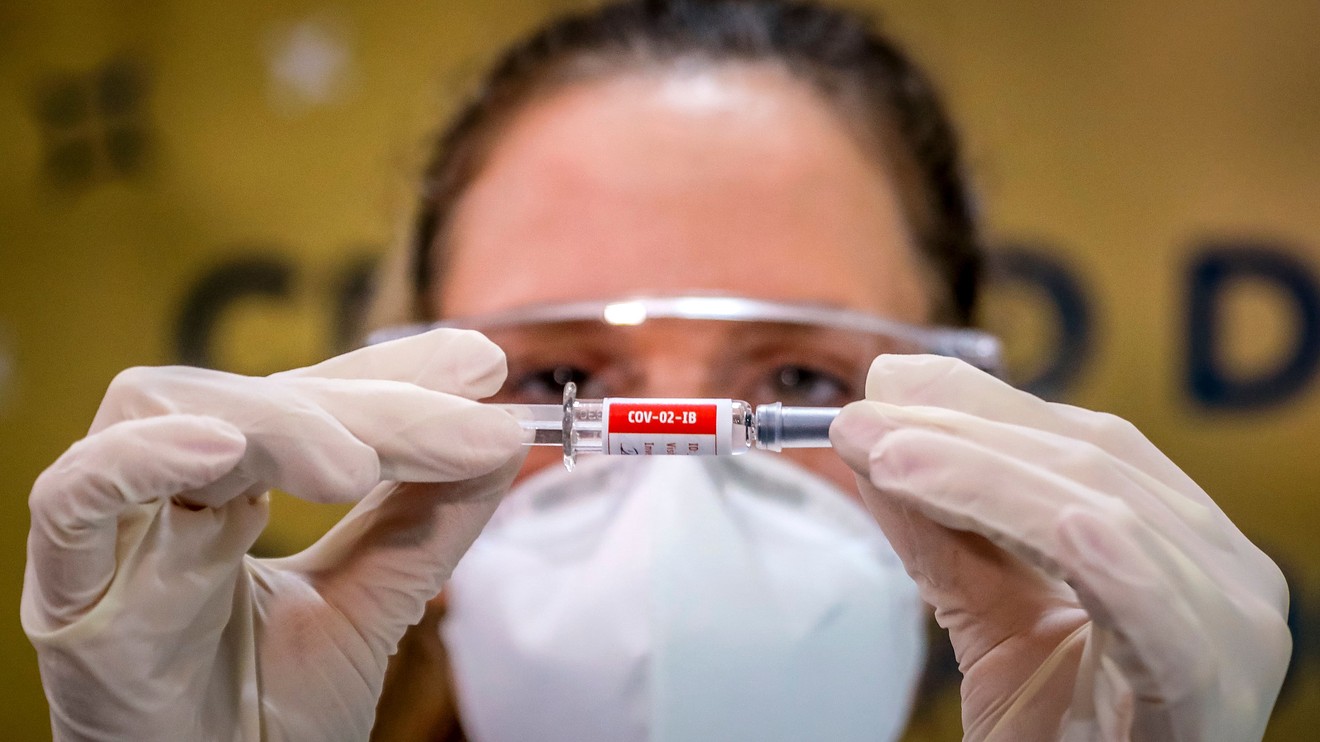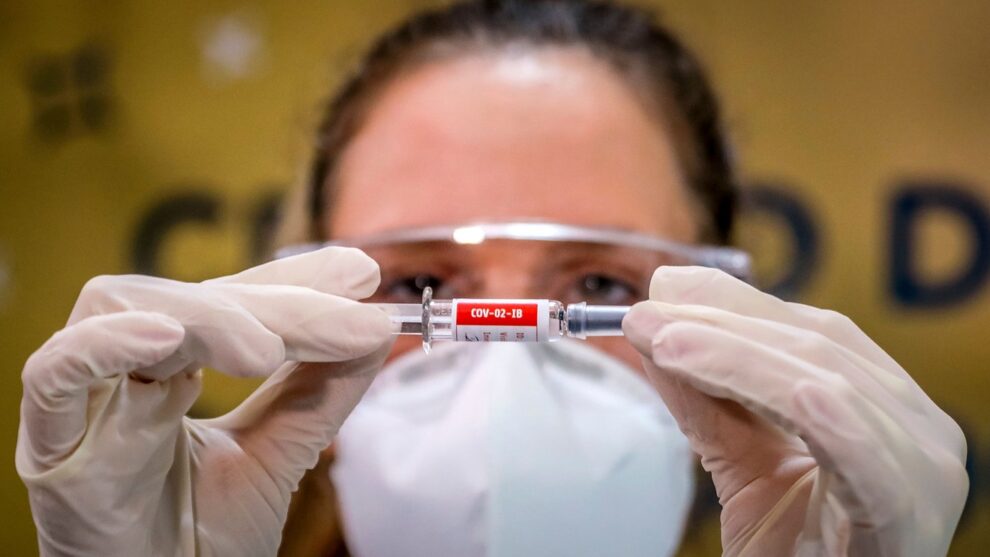
The U.K. government granted emergency-use authorization to the COVID-19 vaccine being developed by Pfizer Inc. and German partner BioNTech SE with some fanfare on Wednesday, but experts are cautioning that the news does not mean the pandemic is close to being over.
The U.K. plans to start inoculating frontline workers as early as next week, but many hurdles remain. The vaccine needs to be stored at minus 94 degrees Fahrenheit and must be transported to the U.K. from a facility in Belgium.
U.K. Health Secretary Matt Hancock acknowledged that would be a challenge but did not offer details on how it would be managed. Prime Minister Boris Johnson, too, conceded that an “immense logistical challenge” lies ahead.
The initial batch is expected to comprise about 800,000 doses, enough to inoculate just half that number of people, as it’s a two-dose regimen.
“ ‘The fact that this EU product is so good that Britain approved it so quickly shows that in this crisis European and international cooperation are best.’ ”
The U.K.’s National Health Service employs about 1.5 million people, according to health think tank the Nuffield Trust, making it the country’s biggest employer and one of the biggest employers globally. The U.K.’s overall population numbers about 67 million.
Hancock suggested the rapid authorization was possible “because of Brexit,” with the U.K. freed of the perceived red tape associated with the European Union, which it is in the process of leaving.
But as German Health Minister Jens Spahn pointed out, the vaccine was jointly developed by a German company, using European Union funds, and a U.S. company.
“The fact that this EU product is so good that Britain approved it so quickly shows that in this crisis European and international cooperation are best,” Spahn told reporters at a Wednesday briefing.
The vaccine itself is still in Phase 3 trials, and participants in such trials are expected to be monitored for several years. Vaccines typically take years to develop, as they require a lot of safety data to ensure they do not have damaging side effects.
See now: Dr. Atul Gawande on COVID-19: ‘It’s never too late to save another 100,000 lives’
The COVID-19 pandemic has mobilized drug companies, biotechs and health agencies to act quickly to find vaccines and therapies, and new technologies are being deployed to speed up the process. The Pfizer and BioNTech PFE, +3.52% BNTX, +6.21% vaccine has been developed in a record 10 months.
Pfizer and BioNTech’s vaccine is a messenger ribonucleuc acid, or mRNA, vaccine, which sends a message to cells telling them to create proteins that can generate an immune response. While there are high hopes for the technology, no mRNA products have been approved in the U.S. for any indication.
Pfizer and BioNTech have not yet made the data from the late-stage trial fully available to the public but have said an analysis of early data found the vaccine to be 95% effective and to show signs of being safe. However, the initial data covered just 170 adult volunteers in a trial involving nearly 44,000 people, and only eight of those actually got the vaccine, with the remaining 162 getting the placebo.
None of the drug makers with vaccine candidates in the works has yet published clinical data for the vaccines’ performance in late-stage clinical trials in peer-reviewed medical journals, which is considered the gold standard when it comes to sharing medical research. They so far have only shared interim data points.
China and Russia have already deployed their own vaccines, and were criticized for doing so before completing Phase 3 trials.
“Ultimately even if a vaccination program was to start this month, the fact that two jabs are required means that it’s likely to be several months before we start to see a possible economic benefit in terms of an easing of restrictions, given that medical staff, along with more vulnerable people, are likely to be the first to benefit, with the general population at the back of the queue,” said MC Markets analyst Michael Hewson.
That means U.K. citizens, like the general populations of other countries, will need to continue to comply with the safety practices recommended by health experts — frequent hand washing, socially distancing and wearing face masks.
Still, Dr. Paul Offit, a pediatrician at Children’s Hospital of Philadelphia and a co-inventor of the rotavirus vaccine, said the news was “reassuring.”
“Right now everything we know is from press releases by the companies. When regulators look at all the data, those below the tip of the iceberg, and conclude that this vaccine is what it appears to be, that is comforting,” he said.
The Pfizer–BioNTech vaccine candidate is one of three front runners currently working their way through trials. Moderna Inc. MRNA, +1.41% is also developing an mRNA vaccine, and has said it generated a 94.5% efficacy rate in its late-stage trial. Moderna is seeking U.S. and EU emergency-use authorizations for its candidate.
See also:COVID-19 vaccines should be designed for people, not for profits
A third vaccine being developed by AstraZeneca PLC AZN, +0.77% AZN, -0.99% with Oxford University — a viral vector-based vaccine — recently produced some confusing results, with the vaccine appearing 62% effective when tested as originally planned but 90% effective when a manufacturing error lead to a reduced initial doze for some volunteers.
The U.S. Food and Drug Administration is to meet on Dec. 10 to review the Pfizer–BioNTech vaccine candidate and could also issue an emergency-use authorization. Moncef Slaoui, head of the government’s “Operation Warp Speed” program aimed at accelerating development of a safe and effective vaccine, told ABC News he expects the FDA to reach the same conclusion as its U.K. counterpart.
See now:U.S. COVID-19 death toll tops 270,000 as CDC pushes ahead with plans for expected vaccine rollout
Pfizer shares were up 2.8% Wednesday and have gained 9% this year to date. BioNTech’s American depositary receipts were up 4.8% and have surged 253% in 2020. The SPDR S&P Biotech ETF X, +3.38% has gained 39% in the same period, while the benchmark S&P 500 SPX, +0.17% has advanced by 13%.











Add Comment